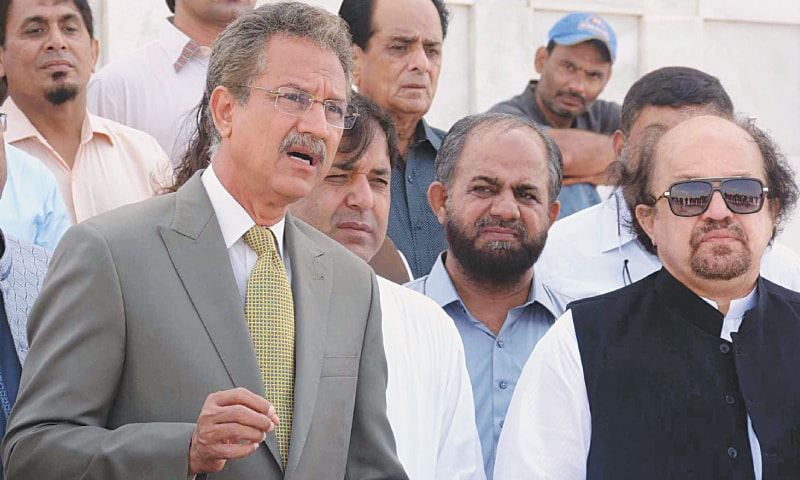KARACHI: City Mayor Wasim Akhtar signed a memorandum of understanding (MoU) with the Child Life Foundation on Monday to improve child healthcare and set up a special ward for children at the Abbasi Shaheed Hospital.
Speaking to media representatives, Mr Akhtar said that due to limited resources the Karachi Metropolitan Corporation (KMC) had decided to contract out facilities to charities and coordinate with various welfare organisations in different sectors of public life.
Such coordination was particularly required in the field of medical treatment and diagnosis for which agreements had been signed with various organisations, he said.
Mr Akhtar stressed that the mayor, deputy mayor and district chairmen were united in their efforts, and those who were spreading “rumours” of a rift within the local government leadership “are actually living in a fool’s paradise”.
He also denied that MQM-Pakistan’s leader Dr Farooq Sattar had questioned his performance.
Karachi mayor denies rift within local government leadership
The top priority of the elected local representatives was to serve the city, he said. “I don’t have time to pay any attention to such fabricated reports, which reflect the desire of some people.”
He said he was completely satisfied with performance of the local government leadership despite having limited resources.
The mayor said the Sindh government had taken over all the revenue-generating departments, and by taking control of the Karachi Water and Sewerage Board, Sindh Building Control Authority and the Solid Waste Management Board, it had made the resources of the local government even more meagre.
Earlier, while speaking at the MoU signing ceremony, Mr Akhtar said the emergency unit of the special childcare ward at the Abbasi Shaheed Hospital would come online by the end of this year.
“I hope we would be talking about it proudly within the next six months. Some 45 per cent children can be saved by having a good emergency ward here,” he said. “I felt bad when I visited the hospital [for the] first time after taking charge of the office. It would be a gift to citizens if we could make it a better hospital.”
Mr Akhtar also met doctors and paramedics at the hospital. “We all have to make concerted efforts so that people could be provided with better healthcare facilities,” he said.
Speaking on the occasion, the Child Life Foundation’s chief executive said only three emergency rooms were available in the hospitals run by the KMC while some 4,500 children required emergency room facilities.
Meanwhile, Mr Akhtar also visited the mausoleum of the Quaid-i-Azam on the 69th death anniversary of the country’s founder and laid floral wreath on his grave.
Published in Dawn, September 12th, 2017














































Dear visitor, the comments section is undergoing an overhaul and will return soon.